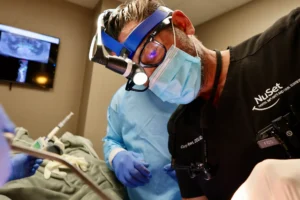Dental implants can transform your smile and improve your quality of life, restoring your ability to chew and speak with confidence. And with a success rate of over 95%, it’s rare for dental implant infections to occur. But knowing how to prevent dental implant infection can give you peace of mind.
Certain factors, like smoking, diabetes, preexisting gum disease, and poor oral hygiene can increase the risk of infection. Fortunately, you can take straightforward steps to keep your implants safe and healthy and ensure they last for years.
At Nuset Dental Implants and Oral Surgery, we are committed to sharing everything you need to know about preventing dental implant infections, from understanding the causes to adopting practical care strategies, we have got you covered!
Key Takeaways
- To prevent dental implant infections, maintain proper oral hygiene, get regular checkups, and follow your dentist’s care instructions diligently.
- Smoking, gum disease, and diabetes increase the risk of infection, so managing these factors is essential.
- Following post-operative care instructions ensures optimal healing and reduces infection risks.
- Early signs of infection include swelling, pain, and gum recession. If you are experiencing any of these symptoms consult your dentist as soon as possible.
- Maintaining a healthy diet supports your immune system and promotes successful implant recovery.
What Is a Dental Implant Infection?
A dental implant infection occurs when harmful bacteria invade the tissue surrounding an implant, causing inflammation and potential complications. These rare infections can manifest in two primary forms:
- Peri-implant mucositis: A mild infection affecting the gum tissue around the implant. Symptoms include redness, swelling, and gum bleeding.
- Peri-implantitis: A more severe infection involving the bone supporting the implant. This condition can lead to pain, pus formation, gum recession, implant mobility, and bone loss.
If left untreated, peri-implantitis can compromise the stability of the implant and may even require its removal.
How to Prevent Dental Implant Infection
Taking proactive steps can help protect your dental implants from infection. Here’s what you can do:
- Practice excellent oral hygiene: Brush your teeth gently but thoroughly at least twice daily and floss regularly with a water flosser. Pay extra attention to the implant site to remove plaque and debris.
- Follow post-operative instructions: Your dentist will provide specific care guidelines after your procedure. Adhering to these instructions is vital for proper healing.
- Schedule regular dental checkups: Routine visits allow your dentist to monitor the health of your implants and address any potential issues early.
- Quit smoking: Smoking tobacco is a significant risk factor for implant infections. Reducing or quitting can greatly improve your implant’s success.
- Maintain a healthy diet: Eating a balanced diet rich in nutrients supports your immune system and overall oral health.
- Avoid risky behaviors: Don’t use your teeth as tools or chew on hard objects, which can stress your implants and gums.
What are the Signs of a Dental Implant Infection?
Recognizing the symptoms of an infection early can have a large impact. Common signs to look out for include:
- Red, inflamed gums around the implant site.
- Swelling near the implant.
- Bleeding gums during brushing or flossing.
- Pain or discomfort, especially when chewing.
- Pus or discharge from the implant area.
- Gum recession, exposing the implant’s surface.
- Implant looseness or mobility.
- Persistent bad breath or a foul taste.
If you experience any of these symptoms, consult your dental implant specialist immediately.
Causes of Dental Implant Infections
Several factors can contribute to dental implant infections:
- Poor oral hygiene: Neglecting proper brushing and flossing allows bacteria to accumulate around the implant.
- Smoking: Reduces blood flow and weakens the body’s ability to heal and fight infections.
- Gum disease: Preexisting gum infections can spread to the implant site.
- Improper post-operative care: Failing to follow your dentist’s recovery instructions for post-operative care can create a breeding ground for bacteria.
- Weakened immune system: Conditions like diabetes or certain medications can hinder the body’s ability to heal.
- Surgical issues: Improper placement or sterilization during surgery can introduce bacteria to the site.
By addressing these risk factors, you can significantly reduce the likelihood of infection.
What to Do If You Suspect an Infection
If you notice signs of infection, take these steps immediately:
- Contact your dental implant specialist: Report your symptoms and schedule an evaluation with Dr Ryan.
- Follow professional guidance: Adhere to your dentist’s treatment plan, which may include antibiotics or other interventions.
- Maintain oral hygiene: Continue to clean your teeth and implants as instructed.
- Rest and recover: Prioritize self-care to support healing.
Early intervention can prevent complications and help preserve your dental implants.
What Are Dental Implants?
Dental implants are a revolutionary solution for replacing missing teeth. They consist of implant posts inserted into the jawbone, serving as sturdy foundations for dental restorations like crowns or bridges. Dental implants not only look and function like natural teeth but also provide these benefits:
- Improved chewing: They restore your ability to eat comfortably and enjoy your favorite foods.
- Enhanced appearance: Implants support your facial structure, preventing the sunken look often associated with missing teeth.
- Natural aesthetics: Designed to mimic real teeth, implants blend seamlessly with your smile.
However, preventing infections is key to ensuring your implants’ long-term success.
Safeguard Your Smile with Nuset Dental Implants and Oral Surgery
Protecting your dental implants from infection is essential for maintaining your smile’s health and longevity. At Nuset Dental Implants and Oral Surgery, we prioritize your oral health with personalized care and advanced techniques to ensure successful implant procedures.
Our experienced team provides guidance on preventing infections and supports you throughout your implant journey. Schedule a cost-free consultation today to learn how we can help you achieve a confident, healthy smile.
Frequently Asked Questions
What causes dental implant infections?
Implant infections are typically caused by harmful bacteria around the implant. Risk factors include poor hygiene, smoking, gum disease, and a weakened immune system.
Can a dental implant infection go away on its own?
Dental implant infections require prompt professional treatment. Early intervention with antibiotics and proper care can resolve the issue and prevent complications.
How common are infections after dental implants?
Implant infections are rare, occurring in a small percentage of cases.
How do I know if my dental implant is infected?
Signs of infection include redness, swelling, pain, pus, gum recession, and implant mobility. Contact your dental implant specialist if you experience any of these symptoms.
How can I help my dental implant heal?
Follow your dentist’s care instructions, maintain excellent oral hygiene, eat a balanced diet, and avoid smoking to support the healing process.





